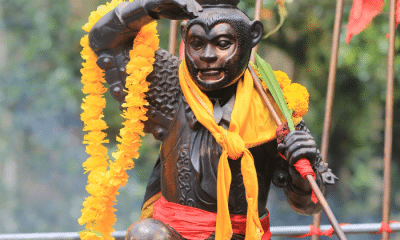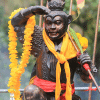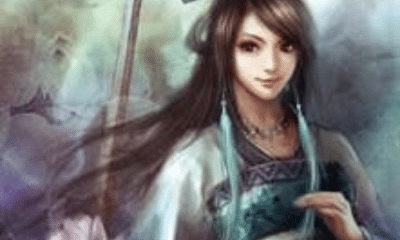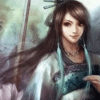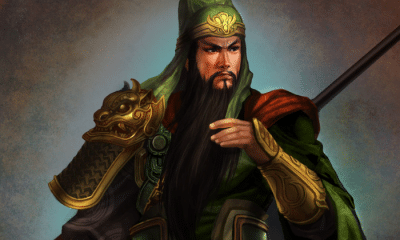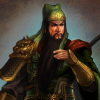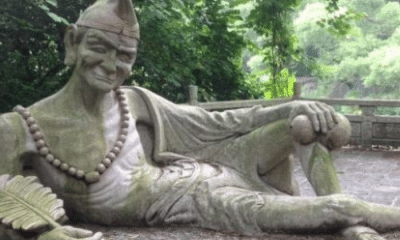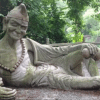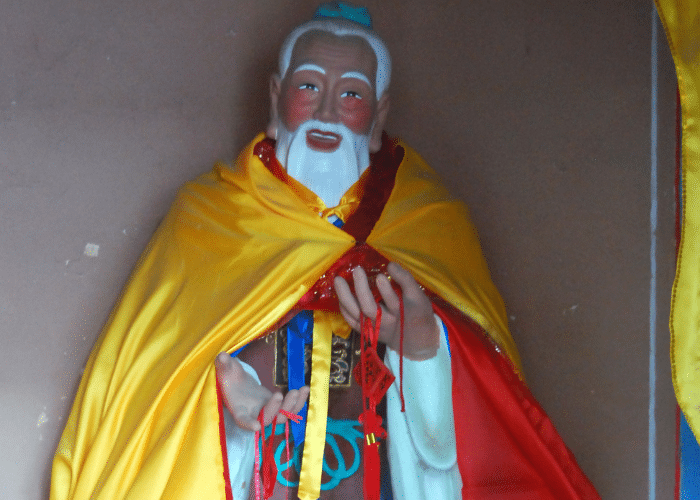
Chinese
Yue Lao: The Old Man Under the Moon
Yue Lao: The Old Man Under the Moon
In Chinese mythology love and marriage were not dictated by a goddess of beauty, but by the contents of an old man’s book. Keep reading to find out more about Yue Lao and the role destiny played in matters of love.
The people of ancient China were firm believers in destiny. While a person could make some choices, the overall trajectory of their life was foretold before they were even born.
This included who they would marry. Future couples were named in a book of fate and it was the job of Yue Lao to match them up.
Using a red string, Yue Lao bound together the men and women who would someday become partners. As his legend showed, attempts to deny or undo these bonds were futile and could only lead to tragedy.
The romantic image of lovers tied together by Yue Lao’s string underscored a reality that was often much less romantic. Throughout most of Chinese history, people had as little say in who they would marry as they would if it had been written by the gods of destiny.
Yue Lao and the Destiny of Marriage
In Chinese mythology, Yue Lao is a god of love and marriage. Specifically, he orchestrates the fate that brings couples together.
Yue Lao appears as an old man who is most often seen at night. Some legends claim that he lives in “obscure regions” associated with the underworld, while others claim that he makes his home within the moon itself.
Yue Lao studies a book that lists the future marriages of every man and woman in the world. When he matches a couple he uses a red silk thread to bind them together.
In his most well-known legend, a young man came across Yue Lao under the light of the moon.
Wei Gu was a young man who lived during the Tang Dynasty. One night he happed to notice an old man who was sitting alone and reading by moonlight.
Wei Gu asked what the old man was doing and Yue Lao matter of factly told him what his role was. Wei Gu doubted the old man’s story.
They walked together, however, until they came to the market. When an old blind woman passed by with a three year old girl in her arms, Yue Lao pointed to the child and claimed that she was Wei Gu’s future wife.
Wei Gu still did not believe that the old man was a god and he refused to believe that he was fated to marry the child of a blind woman. He ordered his servant to stab the little girl to prove that the old man’s prophecy was wrong.
Fourteen years later, Wei Gu was ready to marry. He made a good match with the daughter of a governor, but could not understand why the young lady had not been promised to anyone before.
The governor explained that his daughter was a beautiful girl but her prospects had been diminished by an injury. She walked with a limp and had a scar on her back.
When Wei Gu asked what had caused these injuries, he learned that his future bride had been stabbed by an unknown man when she was just three years old.
Wei Gu married the girl that Yue Lao had foretold and they had three children together. Knowing the old man’s power, Wei Gu sought him out to arrange marriages for his two sons and his daughter.
Yue Lao remembered the man’s lack of faith and cruelty in his youth, so he refused to make matches for the Wei children. No matter how much Wei Gu pleaded with him, he refused to open his book.
Finally, Wei Gu gave up and tried to arrange the marriages through mortal matchmakers instead. Each time he tried, however, the match fell through and his children remained unwed.
My Modern Interpretation
Yue Lao’s legend illustrates two realities about marriage in Chinese culture.
The Chinese, like the people many cultures, were believers in fate. They believed that a person’s destiny was preordained and little could be done to alter its course.
Many legends show the ways in which a person’s life was planned out.
Two gods were said to record both the time and date of a person’s birth and the exact moment at which they would die. When the book said that a person’s life would end, not even the gods had the full power to change what was written.
Many stories of the births and childhoods of the Taoist immortals reinforced the idea of destiny. Prophecies were often given in legends that alluded to the character’s future victories or the hardships they would face.
In the case of Yue Lao, the very existence of his character proved that men and women had no real choice in who they married.
Love and marriage, like birth and death, were preordained by fate. Yue Lao did not always disclose this fate, but it was written in his book long because couples met in real life.
Accordion to the legend of Wei Gu, Yue Lao knew what couples were bound together from the time they were children. Wei Gu’s bride was promised to him at just three years of age, while he actively attempted to arrange his own children’s marriages before they were ten years old.
This element of the story shows the reality that underscored the destiny Yue Lao represented. Even if fate was not known to the gods, the young men and women of China typically had little say in who they married.
Like many, if not most, ancient cultures, the Chinese practiced arranged marriages. Parents and matchmakers determined which young people would make advantageous and compatible matches, often with no real input from the potential bride and groom themselves.
In some cases, particularly among the upper classes, such marriages could be arranged in infancy or even before birth. In the story, Wei Gu is amazed that the governor’s daughter does not have a match at age seventeen because most young women of her class would be married before that time.
He also did not know that his soon-to-be wife walked with a limp because it would not have been at all unusual for a bride and groom to never meet until the marriage ceremony itself, even if they had been promised to each other since childhood.
While the majority of Chinese marriages were arranged until well into the 20th century, marriage was often a time of stress and sadness for young people. Girls, in particular, rarely had any control over who they would spend their lives with or how they would be treated by him and his family.
In a culture that practiced arranged marriages rather than matches based on love, a character like Yue Lao made the realities of the situation more distant.
By invoking destiny, arrangements for a child’s future were taken out of the parents’ hands. They had made the match, but their choice had been guided by fate rather than their own preferences.
The onus was taken off families and local matchmakers by making a god, instead of them personally, responsible for marriage. Even Yue Lao did not match people together himself, but simply read the preordained pairings from his book.
If marriage was arranged by fate, there was no reason for children to argue or grow angry with their parents’ choices. As the story of Wei Gu illustrated, there was no escaping a marriage set out by destiny and attempts to change this fate would only lead to unhappiness in the future.
In Summary
In Chinese folklore, Yue Lao was the god of love and marriage. Appearing as an old man in the moonlight, he tied future couples together with red strings based on what was written in a book of destiny.
In his most famous legend, a young man tried to challenge Yue Lao’s foretold marriage. He even stabbed the young girl who was destined to be his wife.
Many years later, he was surprised to learn that his new bride had been injured by that attack. Yue Lao’s prophecy had come true despite efforts to change it.
In that story, the man sought out Yue Lao when the time came to arrange his own children’s marriages. They would never be married, however, because Yue Lao refused to tie them to a partner.
The belief that marriage was determined by fate underscored a reality of life throughout much of Chinese history. Yue Lao’s book did not name people who would fall in love, but people whose marriages would be arranged by their families.
The practice of arranged marriage was almost universal, but could also cause conflict and resentment between young people and their families. Attributing the match to fate rather than parental choice took the onus of the decision off of the family and emphasized the futility of trying to avoid this cultural practice.


